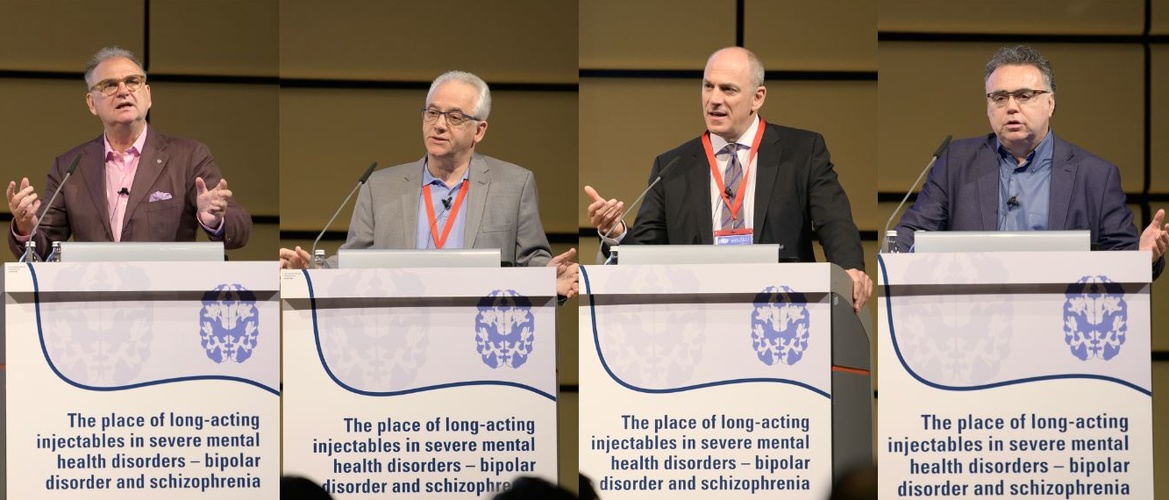
Choose a channel
Check out the different Progress in Mind content channels.

Progress in Mind

A good functional outcome — improved cognition; ability to work, study, live independently, participate in recreational activities and interpersonal relationships; and improved sexual function — is a key objective for individuals with bipolar I disorder and for those with schizophrenia. It depends on symptom control and relapse prevention, and these in turn depend on treatment adherence, which is best achieved using long-acting injectable (LAI) rather than oral antipsychotics, explained experts from Austria, USA, Canada and Spain, in a symposium at CINP 2018. Relapses lead to a progressive deterioration in function, and in schizophrenia are associated with adverse psychosocial consequences. It is therefore particularly important to prevent these complications early in the course of the illness to optimize the potential for better functioning over the long-term.
Many factors contribute to functional outcomes for patients with bipolar I disorder or schizophrenia, including adherence to medication, said Wolfgang Fleischhacker, Professor and Managing Director of the Department of Psychiatry and Psychotherapy, Innsbruck University Clinics, Innsbruck, Austria.
Previous manic episodes are significantly associated with poor function
Functional impairments in patients with bipolar I disorder affect cognition, ability to work, study and live independently and participate in recreational activities, and interpersonal and sexual relationships, 1 said Eduard Vieta, Professor of Psychiatry, University of Barcelona, Catalonia, Spain — and they are significantly associated with previous manic episodes.2
In addition, a significant negative correlation exists between adherence and occupational impairment,3 and adherent patients with therapeutic levels of medications indicated for the treatment of bipolar disorder are less likely to be hospitalized than those who are partially adherent with sub-therapeutic levels.4
Relapse rates in bipolar I disorder range from 40–85% over 1–5 years,5 and are associated with nonadherence to treatment6 (40–50% of patients are nonadherent7) and progressive pathological changes in the brain,8 added Joseph R. Calabrese, Director of the Mood Disorders Program, Case Western Reserve University School of Medicine, Cleveland, Ohio, USA.8
40–50% of patients do not adhere to their treatment
Professor Vieta highlighted that treatment with a LAI antipsychotic improves adherence for patients with bipolar I disorder and has been shown to:
LAI antipsychotic therapy improves treatment adherence
A 52-week safety and efficacy study comparing treatment with a LAI antipsychotic with placebo in patients presenting in the manic phase of bipolar I disorder14 was described by Professor Calabrese. Compared with placebo, those treated with a LAI antipsychotic had:
In terms of tolerability, no clinically meaningful changes were seen in treatment-emergent adverse events or weight gain.14
Antipsychotic therapy helps in preventing relapse in schizophrenia
Relapse prevention is particularly important early in the course of schizophrenia to prevent psychosocial consequences in terms of education or work opportunities, said Wolfgang Fleischhacker, Professor and Managing Director of the Department of Psychiatry and Psychotherapy, Innsbruck University Clinics in Innsbruck, Austria.
A systematic review and meta-analysis of 65 randomized controlled trials involving 6493 patients with schizophrenia has demonstrated that after 12 months, 64% of patients on placebo relapse compared with 27% of patients on antipsychotic therapy.15
Furthermore, compared with oral antipsychotics, LAI antipsychotic therapy:
Psychiatrists underestimate patient acceptability of LAI antipsychotic therapy
Early initiation of treatment with a LAI antipsychotic could be beneficial for both patients with schizophrenia and their carers, and might possibly change the course of the illness, said Ofer Agid, professor of psychiatry, Schizophrenia Program, Centre for Addiction and Mental Health in Toronto, Canada.
However, despite the evidence that early and effective treatment favorably alters outcomes, treatment with a LAI antipsychotic is generally not considered for first-episode patients.19 Psychiatrists underestimate patient acceptability of LAIs20 and tend to reserve it for patients with established nonadherence, poor insight, and multiple relapses, explained Professor Agid.
Doctor–patient communication is critical for patient acceptance of treatment and can benefit from a shared decision-making approach informed by the clinical evidence, Professor Agid said. Addressing the goals that are of value to an individual patient and involving the patient are key to treatment success.
This symposium was sponsored by H. Lundbeck A/S.